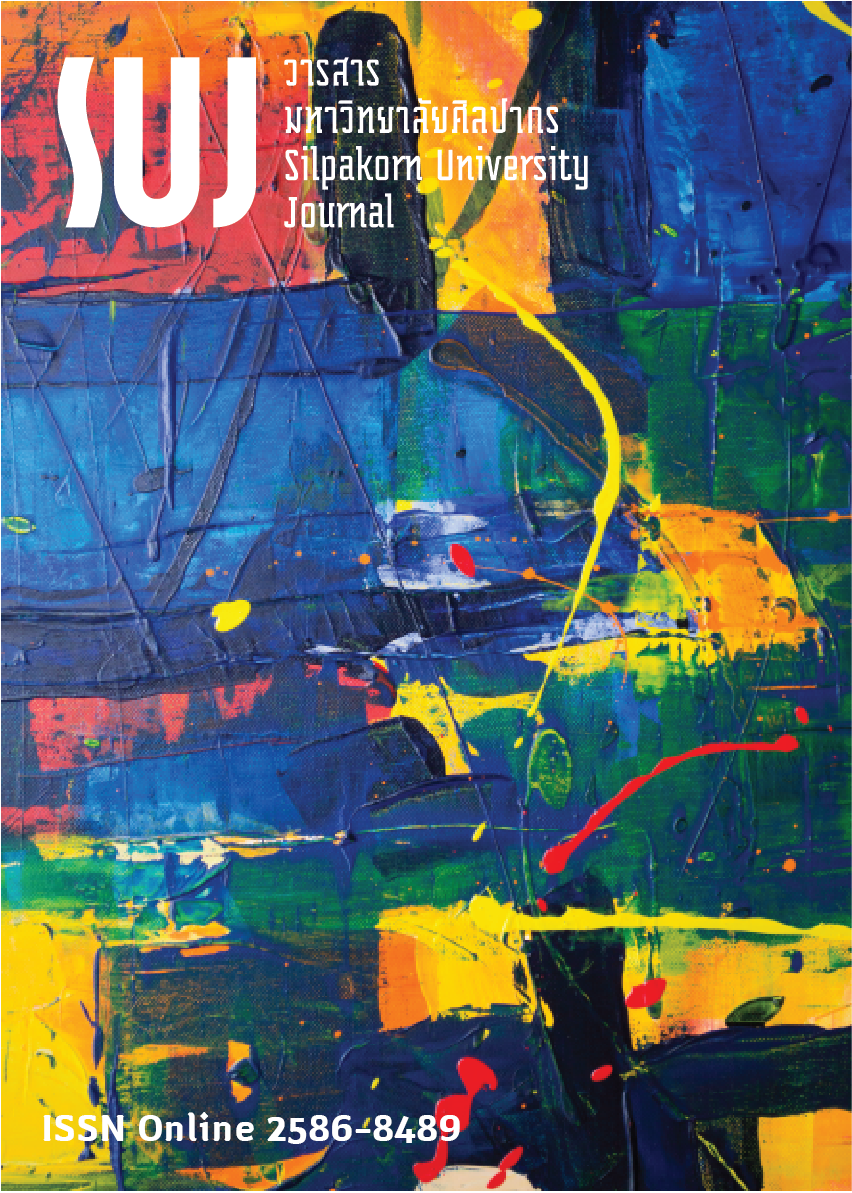วัจนกรรมในการแถลงข่าวของศูนย์บริหารสถานการณ์การแพร่ระบาดของโรคติดเชื้อไวรัสโคโรนา 2019 (ศบค.) (The speech acts of Centre for COVID-19 Situation Administration’s (CCSA) press conference)
Main Article Content
Abstract
บทความนี้มีวัตถุประสงค์เพื่อศึกษาวัจนกรรมในการแถลงข่าวของศูนย์บริหารสถานการณ์การแพร่ระบาดของโรคติดเชื้อไวรัสโคโรนา 2019 (ศบค.) โดยใช้แนวคิดวัจนกรรมของ Searle เก็บข้อมูลจากคลิปวิดีโอการแถลงข่าวที่เผยแพร่บนเว็บไซต์ยูทูปช่อง “ไทยคู่ฟ้า ทำเนียบรัฐบาล” ตั้งแต่วันที่ 26 มีนาคม - 30 เมษายน พ.ศ. 2563 รวมจำนวน 36 ตัวบท ผลการศึกษาพบว่า การแถลงข่าวของศูนย์บริหารสถานการณ์โควิด-19 พบวัจนกรรมทั้งสิ้น 4 กลุ่ม ได้แก่ 1. วัจนกรรมกลุ่มบอกกล่าว ประกอบด้วย วัจนกรรมการรายงานและวัจนกรรมการยืนยัน 2. วัจนกรรมกลุ่มชี้นำ ประกอบด้วย วัจนกรรมการขอร้องและวัจนกรรมการแนะนำ 3. วัจนกรรมกลุ่มผูกมัด ประกอบด้วย วัจนกรรมการสัญญาและวัจนกรรมการขู่ และ 4. วัจนกรรมกลุ่มแสดงความรู้สึก ประกอบด้วย วัจนกรรมการขอบคุณ วัจนกรรมการขอโทษ วัจนกรรมการแสดงความเสียใจ วัจนกรรมการชื่นชม วัจนกรรมการแสดงความยินดี และวัจนกรรมการอวยพร จะเห็นว่ารัฐมิได้ใช้วัจนกรรมกลุ่มบอกกล่าวเพื่อรายงานข้อมูล ข้อเท็จจริงเกี่ยวกับสถานการณ์การแพร่ระบาดของโรคซึ่งเป็นหน้าที่หลักของการแถลงข่าวเท่านั้น แต่ยังปรากฏวัจนกรรมกลุ่มชี้นำ วัจนกรรมกลุ่มผูกมัด และวัจนกรรมกลุ่มแสดงความรู้สึก เพื่อสร้างความรู้ความเข้าใจอันดีระหว่างรัฐบาลและประชาชน ก่อให้เกิดการกระทำหรือไม่กระทำบางสิ่งบางอย่างที่รัฐมุ่งหวัง อันนำไปสู่การควบคุมสถานการณ์การแพร่ระบาดของโรคในที่สุด
The article aimed to analyze Speech Acts in the press conference of the Centre for COVID-19 Situation Administration (CCSA), by using Searle’s (1969, 1976) Speech Act theory in pragmatical perspective. The data were collected from 36 press conference video clips which published on the Youtube channel “Thai Ku Fah Government House” from March, 26 to April, 30 2020. The result shows that the CCSA used following four groups of Speech Acts: 1. Representatives consist of Reporting and Asserting, 2. Directives consists of Requesting and Recommending 3. Commissives consist of Promising and Threatening, and 4. Expressives consist of Thanking, Apologizing, Expressing Condolences, Admiring Congratulating and Blessing. The result shows that the CCSA used not only the group of Representatives to report the pandemic’s situation which is the key point of this press conference, but also used other groups of Speech Acts to conduct public relations and disseminate the accurate and factual information and news in order to enhance good understanding between the government and the crowd. Those indicated the spectator to do or not to do something that the state aimed for, which is beneficial to control the pandemic of the disease.
Downloads
Article Details

This work is licensed under a Creative Commons Attribution-NonCommercial-NoDerivatives 4.0 International License.
References
Chaiyachok, Pimpaka, & Gadavanij, Savitri. (2019). A Study of Speech Acts on the Best Protest Songs of All Time (การศึกษาวัจนกรรมในเพลงประท้วง (Protest Songs) ยอดนิยมตลอดกาล). MFU Connexion, 8(2): 125-153.
Daily News. (2020). The Government established CCSA; Prayuth become the director (รัฐบาลตั้ง ‘ศูนย์บริหารสถานการณ์โควิด-19’ บิ๊กตู่นั่งปธ.). [Online]. Retrieved January 3, 2021 from https://www.dailynews.co.th/politics/762531
Department of Disease Control. (2020). Covid-19 Situation Reports (รายงานสถานการณ์โควิด-19). [Online]. Retrieved April 28, 2020 from https://covid19.th-stat.com/
Eakapont, Thanapon, Wongpinunwatana, Wirat, & Plangcharoensri, Panpan. (2020). NOVEL CORONA VIRUS 2019 IS ENEMY : A Study of Conceptual Metaphors of Thai People According to The Cognitive Linguistics ([ไวรัสโคโรนาสายพันธุ์ใหม่ 2019 คือ ศัตรู]: การศึกษาอุปลักษณ์เชิงมโนทัศน์ของคนไทยตามแนวภาษาศาสตร์ปริชาน). Journal of Language Religion and Culture, 9(1): 1-37.
Government Gazette. (2020). Notification of the Ministry of Public Health Re: Designation and Main Symptoms of Dangerous Communicable Diseases (Issue 3) (ประกาศกระทรวงสาธารณสุข เรื่องชื่อและอาการสำคัญของโรคติดต่ออันตราย (ฉบับที่ 3)). [Online]. Retrieved January 3, 2021 from https://www.ratchakitcha.soc.go.th/DATAPDF/2563/E/048/T_0001.PDF
Government Gazette. (2020). Order of the Prime Minister No. 5 /2563 Re: Establishment of a Special Task Force to Perform Duties in Accordance with the Emergency Decree on Public Administration in Emergency Situations B.E. 2548 (2005) (คำสั่งนายกรัฐมนตรี ที่ 5/2563 เรื่องการจัดตั้งหน่วยงานพิเศษเพื่อปฏิบัติหน้าที่ตามพระราชกำหนดการบริหารราชการในสถานการณ์ฉุกเฉิน พ.ศ. 2548). [Online]. Retrieved January 3, 2021 from https://www.ratchakitcha.soc.go.th/DATA/PDF/2563/E/069/T_0006.PDF
Hassajamnong, Karantarat, & Liamprawat, Suwattana. (2019). Speech Act Usage in Song of State Institutions of Higher Education (การใช้วัจนกรรมในเพลงประจำสถาบันอุดมศึกษาของรัฐ). Veridian E-Journal, 12(3): 86-99.
Liamprawat, Suwattana. (2020). Speech acts in Royal Speech delivered by King Rama VI (วัจนกรรมในพระราชดำรัสพระบาทสมเด็จพระมงกุฎเกล้าเจ้าอยู่หัว). Journal of the faculty of Arts, Silpakorn University, 42(2): 1-20.
Phanli, Suradech. (n.d.). Techniques for Organizing a Press Conference (เทคนิคการจัดงานแถลงข่าว). [Online]. Retrieved Febraury 16, 2021 from https://www.pr.chula.ac.th/index.php/15-article/95-2014-06-16-09-35-38
Phingchim, Prapaipan. (2016). When Thai Politicians Apologize: A Pragmatics Analysis of the Speech Act of Apology on Public Media (เมื่อนักการเมืองไทยขอโทษ: การวิเคราะห์วัจนกรรมการขอโทษผ่านสื่อสาธารณะตามแนววัจนปฏิบัติศาสตร์). Journal of Letters, 45(2): 305-350.
Phingchim, Prapaipan. (2017). The Discourse of Press Conferences on Thai Entertainers’ Scandals: a Discourse Analytical and Pragmatic Study (ปริจเฉทการแถลงข่าวอื้อฉาวของบุคคลในวงการบันเทิงไทย : การศึกษาเชิงปริจเฉทวิเคราะห์และวัจนปฏิบัติศาสตร์). Doctoral dissertation, Chulalongkorn University, Bangkok, Thailand.
Public Relations Department. (2011). Standards of Practice Manual (คู่มือมาตรฐานการปฏิบัติงานกระบวนงานการแถลงข่าว). [Online]. Retrieved February 20, 2021 from https://pr.prd.go.th/trat/ewt_dl_link.php?nid=7693&filename=index&nid=7693&filename=index
Rakphasathai. (2017). The difference between /kɔ̀pcaj/ /kɔ̀pkhun/ /kɔ̀pphrákun/ (ขอบใจ ขอบคุณ ขอบพระคุณ ต่างกันอย่างไร). [Online]. Retrieved February 15, 2021 from https://web.facebook.com/Rakphasathai/posts/1405706889546095
Searle, J. R. (1969). Speech Acts: An Essay in the Philosophy of Language. Cambridge: Cambridge University Press.
Searle, J. R. (1976). The Classification of Illocutionary Acts. Language and Society, 5(1): 1-23.
Sukwisith, Wison. (2003). The Speech Act of Reprimanding in Thai (วัจนกรรมบริภาษในภาษาไทย). Master’s dissertation, Chulalongkorn University, Bangkok, Thailand.
Thai Ku Fah Government House. (n.d.). Centre for COVID-19 Situation Administration (CCSA) (ศูนย์บริหารสถานการณ์การแพร่ระบาดของโรคติดเชื้อไวรัสโคโรนา 2019 (โควิด-19) ศบค). [Online]. Retrieved November, 1- December, 30 2020 from https://www.youtube.com/playlist?list=PL1_HQ0XLBDSlZXX2vRtbKv9SCYsnjlins
Triandis, H. C. (1995). Individualism and Collectivism. Boulder: Westview Press.


